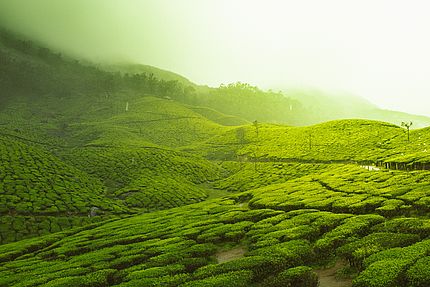ASIA
India
Area: 3.287 million km²
Geography: India is part of the continent of Asia. Most of India forms a peninsula, jutting out into the ocean. The southeast is bordered by the Bay of Bengal, and the southwest is bordered by the Arabian Sea. The Himalayas rise in the north of the country. India’s terrain varies widely, from the Thar Desert in the west to jungles in the northeast. A fertile area called the Ganges Plain covers much of northern India.
Land Degradation: In the last two decades, land degradation has intensified across India, particularly in semi-arid areas. Climate change, depleting water tables, increased pressure for enhanced yields and return on investments have all aggravated land degradation. Recent trends show that land degradation has increased from 81.48 million hectares (mha) in years 2003-05 to 82.64 mha in 2011-13. (ELD et al, 2021)
Sustainable Land Management: Since India is a signatory of the UN Convention to Combat Desertification (UNCCD), the country has set a target of restoring 26 million hectares of degraded land by 2030. (ELD et al, 2021)

ELD ACTIVITIES
-
Policy brief (2022)
Title: Pathways to Agroecology in India - Economic benefits of sustainable land management
Content: This policy brief uses two case studies from India conducted by Development Alternatives (DA) and Watershed Organisation Trust (WOTR) to demonstrate how sustainable land management practices are linked to the holistic approach of agroecology and how economic arguments can support decision making.
Publication: March 2022
Policy brief: EN -
Case Study (2020)
Title: Economic Valuation of Reducing Land Degradation through Watershed Development in East Madhya Pradesh under Risks of Climate Extremes
Content: This study conducted jointly with the Watershed Organisation Trust (WOTR) seeks to assess the economic and environmental benefits of reducing land degradation through sustainable land management practices such as watershed development in eastern Madhya Pradesh and in the context of climate change.
Publication: April 2020
Report: EN
Policy brief: EN -
Case Study (2020)
Title: Land Remediation for Achieving Global and National Targets: Case Study of Bundelkhand (India) through Capitals Approach
Content: This study conducted jointly with Development Alternative (DA) seeks to assess the economic and environmental benefits of land remediation in Bundelkhand situated in the state of Madhya Pradesh amd Uttar Pradesh.
Publication: 2020
Report: EN
Policy brief: EN
CONTACT
ELD Secretariat
E-Mail: info@eld-initiative.org
